Finding the true path to God is the desire of every human heart, however, there are many obstacles in life that often prevent people from finding this path. We read about some of these obstacles in relation to the nation of Israel in this week’s Torah Portion. We will further read about the true path to God in the words of Moses and in the vision of Isaiah.
Devarim – The Words
This week’s Torah Portion is called “דברים” – “Devarim” which is the Hebrew word for “words” in this context. In the first verse of this week’s Torah Portion we are greeted by the introduction to the words of Moses:
These are the words which Moses spoke to all Israel across the Jordan in the wilderness, in the Arabah opposite Suph, between Paran and Tophel and Laban and Hazeroth and Dizahab. It is eleven days’ journey from Horeb by the way of Mount Seir to Kadesh-barnea. In the fortieth year, on the first day of the eleventh month, Moses spoke to the children of Israel, according to all that the LORD had commanded him to give to them, – Deut. 1:1-3
Deuteronomy is a record of the final words of Moses to the Israelites before the LORD gathered him to his people.
The details given in these first few verses help us put in perspective the time and location that Moses spoke these words; it was the first day, in the eleventh month, in the fortieth year since the children of Israel came out of Egypt. The date that Moses began to speak these words is crystal clear, however, the location seems a bit fuzzy.
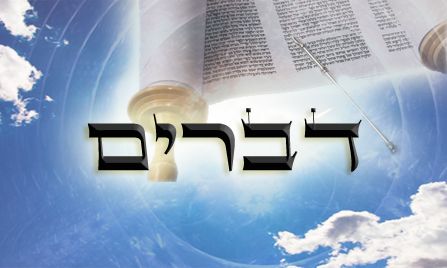
The Location of Moses’ Speech
The verses quoted above begin by explaining that Moses and the Israelites were across the Jordan but then it continues to describe the location as, “opposite Suph, between Paran and Tophel and Laban and Hazeroth and Dizahab” (Deut. 1:1). It seems to be speaking of “Suph” as the Sea of Reeds (The Red Sea) and Paran as the desert area in the south just above Mt. Horeb. The other names of places are unknown. Where was Moses when he was speaking these words?
Despite the seemingly cryptic description of the location which Moses found himself when he spoke these words, we are given a clarifying landmark a couple of verses later which fits perfectly into the historical account: “Across the Jordan in the land of Moab, Moses undertook to expound this law, saying,…” (Deut. 1:5). From the book of Numbers we know that the Israelites were on the other side of the Jordan in the plains of Moab and were getting ready to cross over into the Promised Land. Since this is the case, why does the book of Deuteronomy begin by mentioning these numerous other locations which would put Moses and the people all over the map of the Middle East?
The Forty-Year Journey
I believe that the historical dating and the names of places mentioned in these first five verses of Deuteronomy provide a broader context than simply the date and location of which Moses spoke these words. We are told that the trip from Mt. Horeb (the Mountain of God) to Kadesh-Barnea is an elven day journey. Kadesh-Barnea is a location on the southern border of the Promised Land, a resting place from where they were supposed to enter the Land (Deut. 1:19-20). Because of the rebellion and unbelief of the Israelites they forfeited their right to enter the Land and instead, wandered around the wilderness for 40 years. And so it is written “In the fortieth year” (Deut. 1:3). The names of places ranging from Suph, Paran, and Moab provide an overview of the forty-year journey.
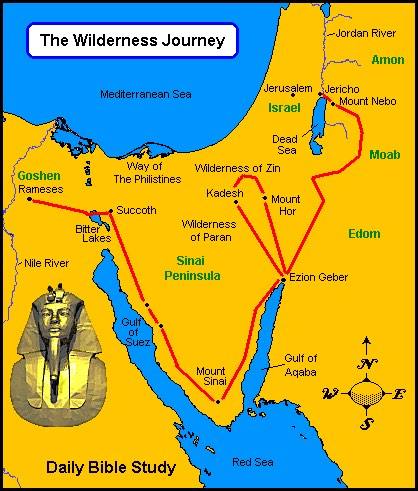
Throughout the first three chapters of Deuteronomy, and the entire book of Deuteronomy as well, Moses continually reminds the Israelites about their stiff-necked attitude toward the LORD and how they need to change their ways as they enter the Promised Land. This week’s Torah Portion ends with this exhortation from Moses to his successor, Joshua:
I commanded Joshua at that time, saying, ‘Your eyes have seen all that the LORD your God has done to these two kings; so the LORD shall do to all the kingdoms into which you are about to cross. Do not fear them, for the LORD your God is the one fighting for you.’ – Deut. 3:21-22
Joshua and the children of Israel needed to remember that they were not alone and that the battle before them belonged to the LORD. If they relied on their own strength they would surely fail, however, if they relied on the LORD they would succeed at every turn. This is the main message of Moses to the children of Israel and we read of a similar message in this week’s reading from the prophets.
Shabbat Chazon
This week’s Torah Portion, Devarim, is read every year at this same time on the Hebrew calendar in connection to the catastrophic date, the 9th day of the Hebrew month Av, otherwise known as “Tisha Be’Av.” This year the 9th of Av falls on this Sabbath but is observed the following day, Sunday, August 14, 2016 because it is observed as a fast day and we can’t fast on the Sabbath, except on Yom Kippur.
The Sabbath day preceding Tisha Be’Av is always called “שבת חזון” – “Shabbat Chazon,” which means, “the Sabbath of Vision.” This name Shabbat Chazon comes from the corresponding section in this week’s reading from the prophets which is taken from the first chapter of Isaiah and begins in this way:
The vision of Isaiah the son of Amoz concerning Judah and Jerusalem, which he saw during the reigns of Uzziah, Jotham, Ahaz and Hezekiah, kings of Judah. – Isaiah 1:1
Shabbat Chazon always occurs on the last Sabbath during the Three Weeks and reminds the Jewish people of the sin of the nation of Israel and the tragic consequences that occurred as a result; the people being expelled from the Land, the destruction of Jerusalem, and the destruction of the Temple.
Fasting and Repentance
In Judaism there is a strong emphasis placed upon repenting from sin and living out all of the commands of the Bible, as best as one is able. There are various days of fasting on the Jewish calendar that are used as reminders of sin and the need to repent. Tisha Be’Av is one of these fast days.
The hope of religious Jews is that the Jewish people as a whole will eventually come to a place where we are united in keeping the commands of God and will thereby bring about the great redemption of God through the coming of the Messiah and the rebuilding of the Third Temple. There are various opinions within Judaism as to how the details and timing of this will work out, however, the hope of a united people devoted to God, the coming of the Messiah, and the rebuilding of the Temple are all part of this great redemption.
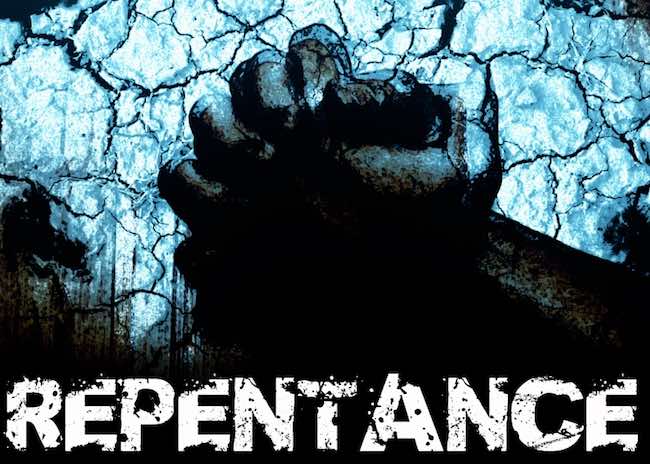
The Vision of Isaiah
One of the reasons that Isaiah 1:1-27 was chosen by the rabbis as the reading from the prophets for this particular Sabbath is because of the harsh rebuke of the sin of the people of Judah, the call to repentance, and the hope of redemption that are all contained in these verses. In Jewish theology, repentance is at the heart of relationship with God.
The LORD has used the prophet Isaiah to detail the sins of the nation of Judah and to offer them a clarion call to repent and turn back to the LORD. The prophetic discourse and poetic nature in which the book of Isaiah has been written is rich with Messianic overtones. It is the Messianic message of the prophet Isaiah that I would like to highlight as I focus on a few of the verses in Isaiah chapter one.
The Seed of Evildoers
As Isaiah begins to explain the vision which he saw he describes a vivid picture of the people of Judah as the sons of a father, who is God Himself:
Listen, O heavens, and hear, O earth; for the LORD speaks, “Sons I have reared and brought up, but they have revolted against Me. An ox knows its owner, and a donkey its master’s manger, but Israel does not know, My people do not understand.”
Alas, sinful nation, people weighed down with iniquity, offspring of evildoers, sons who act corruptly! They have abandoned the LORD, they have despised the Holy One of Israel, they have turned away from Him. – Isaiah 1:2-4
In His anger, the LORD declared that the children of Judah were worse than ox that knows its master or a donkey that knows the source of his food. Judah had rebelled against the LORD and didn’t even know his God.
In further explaining the rebellion of the people of Judah, Isaiah called them a “sinful nation, people weighed down with iniquity, offspring of evildoers, sons who act corruptly!” (Is. 1:4) Isaiah used four different phrases to describe the sin of the people.
The phrase “offspring of evildoers” in Hebrew is “זרע מרעים” – “zerah me’reim,” which is literally translated as “seed of evildoers.” Sin had so marked the people as a nation that the LORD was declaring to them that they were continually producing more sons who do evil through their seed. How were the people of Judah to redeem themselves from generation after generation of iniquity?
One of the main themes of the prophet Isaiah is that the people of Judah and Israel are incapable of delivering themselves from their sin and it is only the LORD Himself who is able to deliver them and redeem them. This theme is brought out continually in the book of Isaiah and we see it illustrated here in connection to the word “seed.”
The Holy Seed
Because of the inability of the people of God to make themselves holy, the LORD knew that He had to provide redemption for them. Later in the book of Isaiah the LORD gave Isaiah a word picture regarding the remnant of the people:
Yet there will be a tenth portion in it, and it will again be subject to burning, like a terebinth or an oak whose stump remains when it is felled. The holy seed is its stump. – Isaiah 6:13
Isaiah had asked the LORD how long the people would have hardened hearts and be unable to return to Him and be healed. The LORD answered that the Land would be left desolate for a time but that there would be a remnant in the Land and that just like a tree which is cut down and is able to grow again from its stump, so the nation will be revived again. The source of the hope for the nation and the people of Judah would be the “the holy seed.”
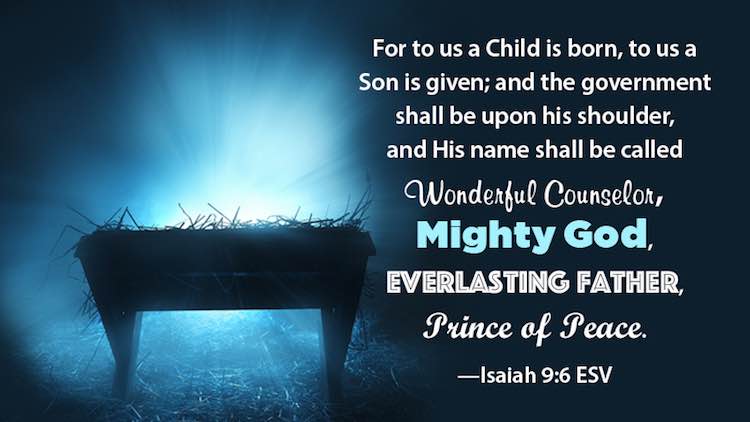
The “holy seed” spoken of in the above verse is the Hebrew phrase “זרע קודש” – “zerah kodesh.” God’s plan for bringing His people back to Himself is through His holy seed, through His “zerah kodesh.” This plan to bring His holy seed into the world is revealed a few verses later through a conversation between the LORD and King Ahaz:
Then the LORD spoke again to Ahaz, saying, “Ask a sign for yourself from the LORD your God; make it deep as Sheol or high as heaven.” But Ahaz said, “I will not ask, nor will I test the LORD!” Then he said, “Listen now, O house of David! Is it too slight a thing for you to try the patience of men, that you will try the patience of my God as well? Therefore the LORD Himself will give you a sign: Behold, a virgin will be with child and bear a son, and she will call His name Immanuel. – Isaiah 7:10-14
The virgin birth of the Messiah only makes sense if there is a miraculous conception through the holy seed of God.
When Isaiah saw the vision as recorded in Isaiah 1:1-4 and proclaimed the status of the sinful seed of the people, he was setting the stage for God’s redemptive plan. The children of Judah and Israel were incapable in themselves of achieving the righteousness of God. They had to fully depend on the LORD for their redemption and this redemption would ultimately be provided through the holy seed of God.
Repentance
As Isaiah continued to write down his vision from the LORD, he recorded the ways in which the people of Judah had transgressed the command of the LORD through their iniquity and how the LORD called them to repentance:
Wash yourselves, make yourselves clean; remove the evil of your deeds from My sight. Cease to do evil, learn to do good; seek justice, reprove the ruthless, defend the orphan, plead for the widow. – Isaiah 1:16-17
The LORD was inviting His people to turn from their evil deeds, cease to do evil, and learn to do good.
The human responsibility to repent from evil and turn to God is universal and timeless, meaning that it is a clear teaching in the Old and New Testaments. Repentance is always the basis of establishing a right relationship with God. Although God does call us to repent from evil and to do good, redemption and salvation are always based on His provision and not on our good works. We see this illustrated in the last section of this reading in Isaiah chapter one.
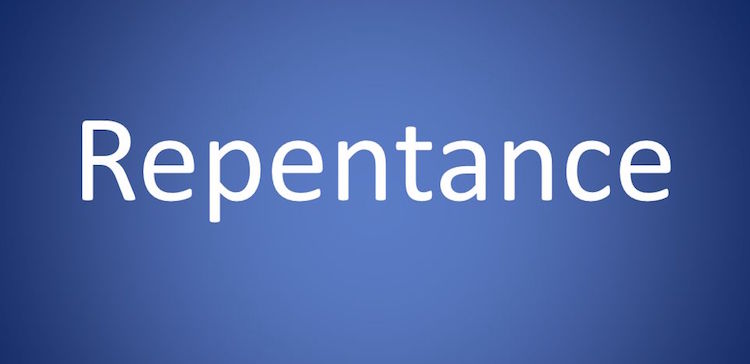
The Search for Justice & Righteousness
The LORD is holy and He longs for justice and righteousness to reign on this earth. He also longs for justice and righteousness to be displayed through His people. This is one of the accusations that Isaiah brings out in his vision:
How the faithful city has become a harlot, she who was full of justice! righteousness once lodged in her, but now murderers. – Isaiah 1:21
Jerusalem is the city that is being called a harlot in this verse. This city that was once filled with justice and righteousness is now described as being filled with murderers.
The deeds of the people had polluted the city to such an extent that it had become an abomination to the LORD. Isaiah continued to layout the accusations against the city like a lawyer bringing a list of offenses against the accused before a judge (Isaiah 1:22-23). The only real hope for the people of Judah was the redemptive hand of God to bring them back to Himself.
The Path to Redemption
Throughout the vision that Isaiah presents to us from the LORD which is recorded in Isaiah 1, there is a constant declaration of the sin of the people, a rebuke of their actions, and a call for them to repent. In the latter part of Isaiah’s vision the redemptive plan of God is more fully disclosed:
Therefore the LORD God of hosts, the Mighty One of Israel, declares, “Ah, I will be relieved of My adversaries and avenge Myself on My foes. I will also turn My hand against you, and will smelt away your dross as with lye and will remove all your alloy. Then I will restore your judges as at the first, and your counselors as at the beginning; after that you will be called the city of righteousness, a faithful city.” – Isaiah 1:24-26
The LORD declared in these verses that He will act on behalf of the people to purify them of their sin. The LORD Himself stated that He will purge the people of their sin and restore righteousness to the city.
Although the vision of Isaiah extends for five more verses, the last verse of the chosen verses for this week’s section from the prophets is Isaiah 1:27: “Zion will be redeemed with justice and her repentant ones with righteousness.” This verse speaks volumes on this subject of redemption.
The LORD is the Redeemer
The redemption that is spoken of in this verse is not based on the actions of the people within the city but rather an action that is brought upon the city. The Hebrew word for “redeemed” in this verse is the word “תפדה” – “tipadeh” and is the passive form of the word for “to redeem, to deliver, to rescue.” The verse clearly declares that redemption will be made for “Zion” and for “her repentant ones” in justice and righteousness. Both the city and the people (those who repent) are redeemed by the LORD Himself in justice and righteousness.
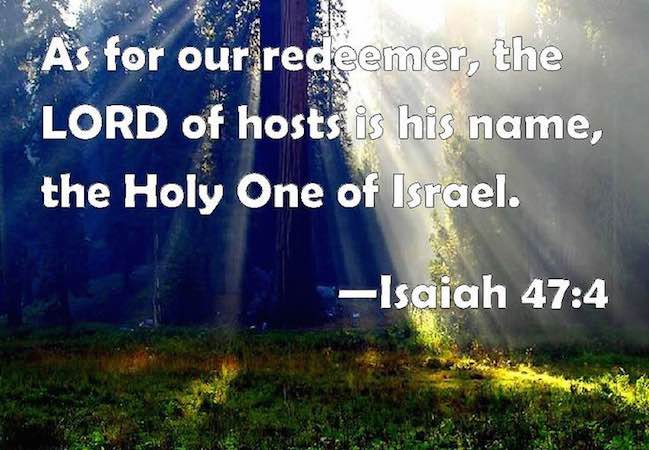
Redeemed in Justice & Righteousness
One final connection that I would like to reference regarding the redemption of the people of Judah and Israel is based on the standard of justice and righteousness which the LORD demands. The LORD alone is able to establish and maintain true justice and righteousness and this is ultimately fulfilled in the LORD’s provision of His Son:
For a child will be born to us, a son will be given to us; and the government will rest on His shoulders; and His name will be called Wonderful Counselor, Mighty God, Eternal Father, Prince of Peace. There will be no end to the increase of His government or of peace, on the throne of David and over his kingdom, to establish it and to uphold it with justice and righteousness from then on and forevermore. The zeal of the LORD of hosts will accomplish this. – Isaiah 9:6-7
The foundation of redemption rests on God alone and He has established redemption in justice and righteousness through His Son, Yeshua the Messiah. True justice and righteousness came together in the sinless sacrifice of the Messiah and will be fully realized when He returns to reign on this earth.
Walking in the Vision of Isaiah
The vision of Isaiah, as recorded in the Scriptures, reminds us of God’s holy standard, of our sin, and of our inadequacy to reform ourselves without His ultimate provision of redemption. We are responsible to repent from our sinful ways and to walk in holiness but this is only possible through God’s provision of redemption.
Shabbat Shalom!
If you enjoyed reading this article, share it today with friends! We also invite you to sign up for our weekly Torah Portion commentary on the sidebar to the right.
Help keep our weekly commentaries free and available to all. Click here to donate today:
Torah Portion: Deut. 1:1 – Deut. 3:22
Haftara: Isaiah 1:1-27
Return to Torah Portion Homepage
Copyright Jewels of Judaism. All rights reserved 2016

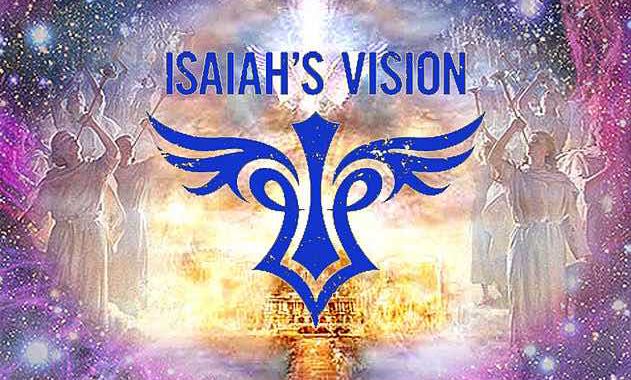

Daniel,
Thank You very much for this week´s Torah Portion, I really enjoyed it.
Blessings upon you!
Elisheva
Thank you for the comments Elisheva!
God bless you!
Daniel